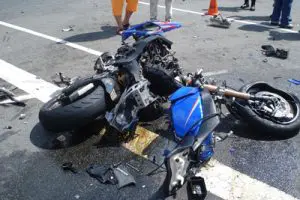Motorcycle Crashes: Five Things You Should Know

Five Things to Know About Motorcycle Crashes
- If you drive a motorcycle, you’re much more likely to be hurt in an accident than those in automobiles. In fact, the U.S. Department of Transportation’s National Highway Traffic Safety Administration reports that motorcyclists are 35 times more likely experience a deadly accident than those in passenger cars.
- In order to be entitled to compensation for injuries sustained in motorcycle crashes, you must be able to prove that the person who injured you acted in a negligent way. In other words, that person had a duty to act in a certain way (i.e. traffic safety laws) and did not. You must also prove that this negligence directly caused your injury and that your injuries are valid.
- Most personal injury attorneys handle motorcycle crashes on a contingency basis. This means that their fee will be paid through any recovery they make on your behalf. The good news for you is that, if you do not win your suit, you likely will not pay legal fees.
- A “settlement” after a motorcycle crash is exactly that – a settlement. That means that you cannot go after the negligent party for more damages. That’s why it’s a good idea to be sure that your medical treatment is completed or entirely assessed before pursuing a settlement.
- Not all suits involving motorcycle crashes are settled. Some suits must be taken to court in order to receive a judgment and reach a resolution.
Got any more questions about motorcycle crashes? We can help. Call for your consultation today.
